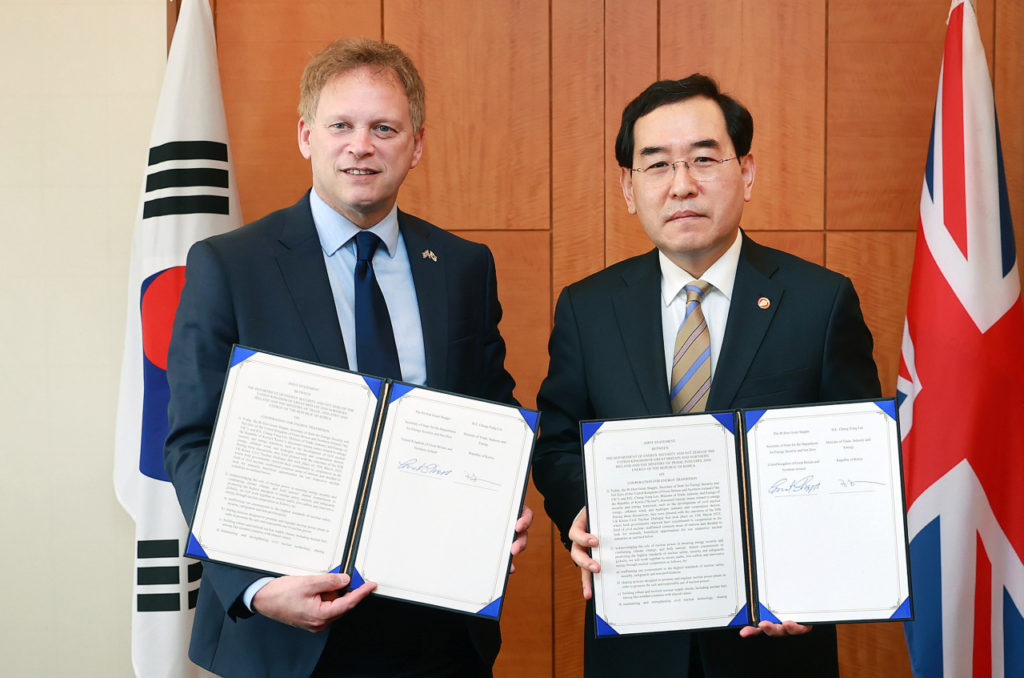|
Getting your Trinity Audio player ready...
|
South Korea and Britain have announced plans to strengthen their cooperation on nuclear power and clean energy. In a joint declaration released on Monday, South Korean Industry Minister Lee Chang-yang and British Minister of the Department for Energy Security and Net Zero Grant Shapps agreed to work together to secure energy security and address climate change.
During a meeting in Seoul, the ministers exchanged their thoughts on the importance of energy transition and agreed on the need to collaborate on designing and constructing nuclear power plants, equipment production, nuclear fuel, and small modular reactors. They also discussed decommissioning nuclear plants, offshore wind power, and hydrogen.
In the joint declaration, the two ministers announced that South Korea would participate in constructing a new nuclear reactor in Britain. The British government launched the Great British Nuclear, a new agency in charge of the country’s nuclear power generation, in March.
Lee emphasized South Korea’s commitment to multilateral efforts for the energy transition to go net zero while prioritizing a stable energy supply. He stated that South Korea planned to actively use nuclear power plants that emit zero emissions to expand the usage of renewable energy.
During his visit to South Korea, Minister Shapps plans to tour the Shin-Kori nuclear plants and the Korea Radioactive Waste Agency. South Korea is one of the world’s most prominent nuclear energy countries, supplying about one-third of the country’s electricity supply.
The two sides expressed their intention to increase exchanges, given that the two countries mark the 140th anniversary of their diplomatic relations. Lee highlighted South Korea’s strengths in manufacturing, while Shapps pointed to Britain’s experience in developing offshore wind power.
Lee also noted that South Korea has much experience in commercial applications of hydrogen, including having the most hydrogen cars running in the world. He expressed enthusiasm for close cooperation with Britain, which possesses advanced technologies in hydrogen production.
While administrations have introduced varying policies on nuclear power plants, incumbent President Yoon Suk Yeol has designated the sector as a strategic industry and set a target for nuclear power to provide a minimum of 35 percent of the country’s electricity supply in 2036.
The two sides also agreed to promote cooperation in other areas related to the energy transition, such as carbon capture and storage (CCS) technology and smart grids.
Regarding CCS technology, Minister Shapps said, “Britain has experience in operating CCS demonstration projects, and I hope to cooperate with South Korea, which has technologies and experience in CCS.”
Smart grid technology is an area where South Korea has advanced, as it has been operating a smart grid pilot project since 2010, and is planning to expand it to a nationwide scale by 2030.
Minister Lee expressed hope that the two countries can cooperate in building a global value chain for the hydrogen economy, by exchanging technologies and information on hydrogen production, storage, and transport.
The joint declaration also highlighted the importance of international cooperation in addressing climate change and achieving carbon neutrality, in line with the goals of the Paris Agreement.
“The joint declaration will serve as a milestone for the two countries to cooperate in nuclear power and other clean energy areas, as well as contribute to the global efforts to tackle climate change,” Minister Lee said.
South Korea and Britain are expected to play important roles in the global transition to clean energy, and their strengthened cooperation in nuclear power and other clean energy sectors is likely to have a significant impact on the global energy landscape.
